Key takeaways:
- Social impact investing blends finance with the goal of generating positive social or environmental outcomes, redefining success beyond just financial gain.
- The social innovation marketplace connects investors with initiatives, fostering collaboration, accountability, and innovation to solve social issues.
- Effective strategies for social impact investments include thorough due diligence, building long-term relationships, and setting clear impact metrics to track progress.
- Investing is about more than money; it involves building trust, learning from challenges, and being flexible to adapt to new opportunities for greater impact.
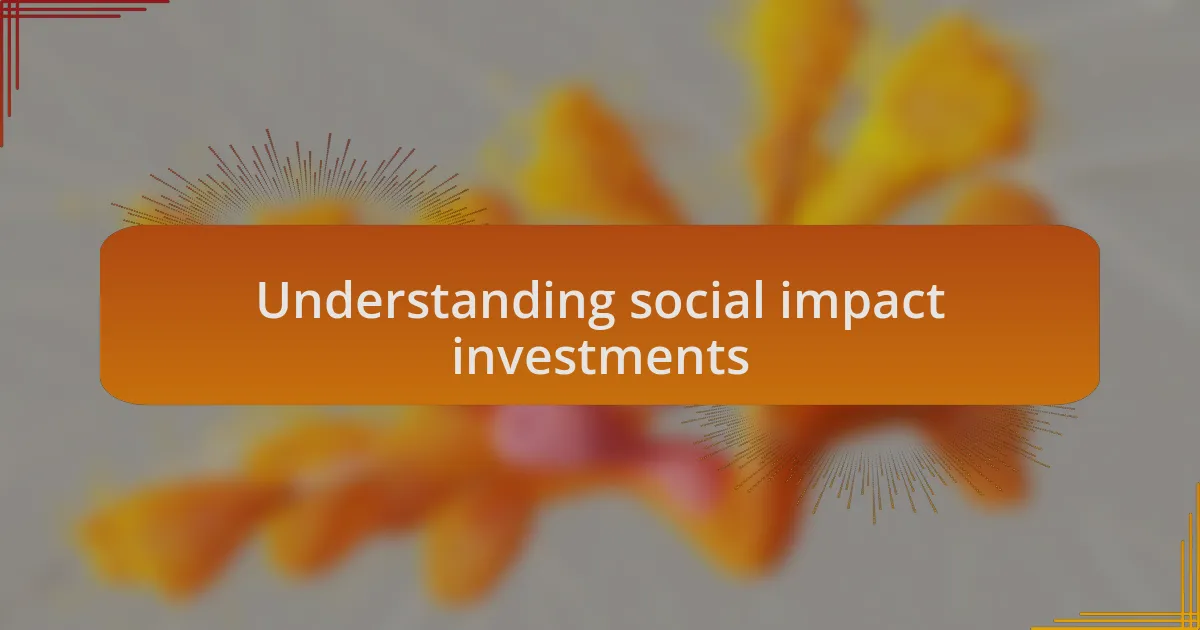
Understanding social impact investments
Social impact investments are a fascinating blend of finance and purpose. They aim to generate positive social or environmental outcomes alongside a financial return. I remember my first foray into this world—seeing the tangible impact of funding a community education program not only transformed lives but also deepened my understanding of how investments can fuel change.
When I think about social impact investments, I often wonder: can we redefine the concept of success in investing? Traditionally, success is measured solely in financial terms, but now we have the opportunity to measure it by the good we create. Reflecting on my experiences, the feeling of aligning my financial choices with my values has been immensely rewarding.
It’s important to recognize that social impact investing is not charity; it’s a strategic approach to solving complex social issues while still expecting financial returns. In one project I was involved with, the blend of innovation and social responsibility was palpable—seeing entrepreneurs thrive while addressing community needs truly reshaped my perspective on what investment can achieve.
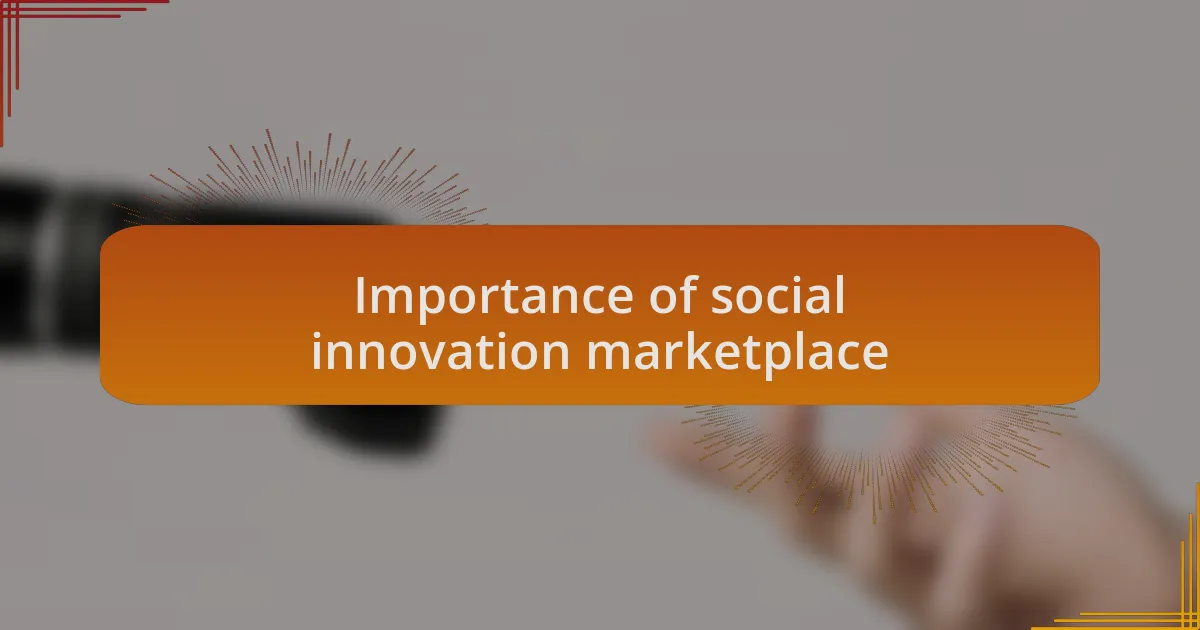
Importance of social innovation marketplace
The social innovation marketplace serves as a vital platform that connects investors with initiatives aimed at creating social change. I find it incredible how this marketplace not only facilitates funding but also fosters collaboration among diverse stakeholders. For instance, during a recent project, I witnessed how a simple connection made through this marketplace enabled a local entrepreneur to access both funding and mentorship, significantly amplifying their impact on the community.
Moreover, the importance of the social innovation marketplace goes beyond mere funding; it cultivates an ecosystem of accountability and transparency. This aspect resonates deeply with me, as I believe that when investors see measurable outcomes from their contributions, it reinforces their commitment to social impact. I remember being part of a roundtable discussion where stakeholders openly shared their successes and challenges, which enriched our collective understanding of effective strategies.
Lastly, this marketplace empowers individuals and organizations to innovate in addressing social issues. Have you ever thought about how transformative it can be when creative ideas meet dedicated resources? I recall meeting passionate founders who leveraged social innovation to tackle mental health challenges in underserved populations. Their stories reminded me that the synergy created in this marketplace can unlock solutions that fundamentally change lives, highlighting just how crucial it is to nurture these connections.
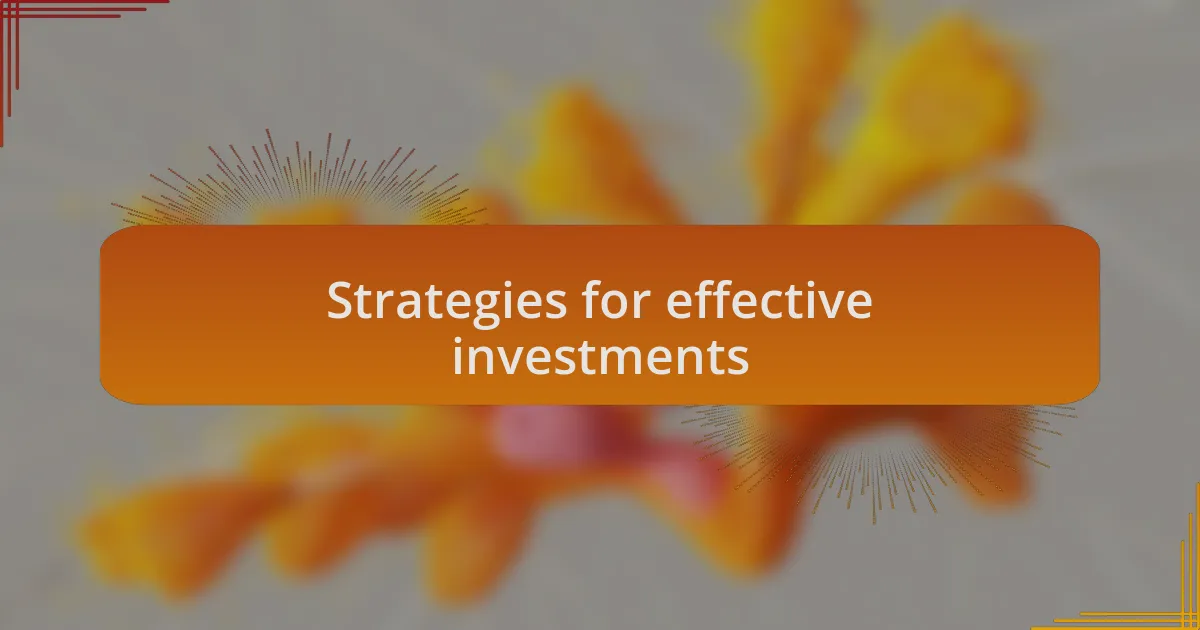
Strategies for effective investments
When considering strategies for effective social impact investments, I’ve found that conducting thorough due diligence is key. This involves not just assessing financial viability but also understanding the social mission behind the initiative. I recall evaluating a project focused on renewable energy for low-income households. It wasn’t just about the numbers; I needed to gauge the community’s trust in the project leaders and their commitment to sustainability. This holistic view helped me feel confident in my investment.
Another strategy I embrace is building long-term relationships with entrepreneurs and social enterprises. Trust and collaboration can often lead to more impactful outcomes than a one-off transaction. A recent collaboration with a startup aiming to provide clean water solutions taught me the value of staying involved and offering ongoing support. Seeing their growth over time reassured me that investing isn’t just a financial act but an evolving partnership.
Moreover, I’ve learned that setting clear impact metrics early on is essential for tracking progress. How else can we measure the success of our investments? By defining what success looks like from the start, I can align my expectations with the initiatives. For instance, when I invested in a program focused on youth education, we agreed on measurable outcomes which not only held us accountable but also highlighted areas for improvement as we moved forward. This proactive approach keeps the momentum going and reinforces the importance of tracking progress in creating social value.
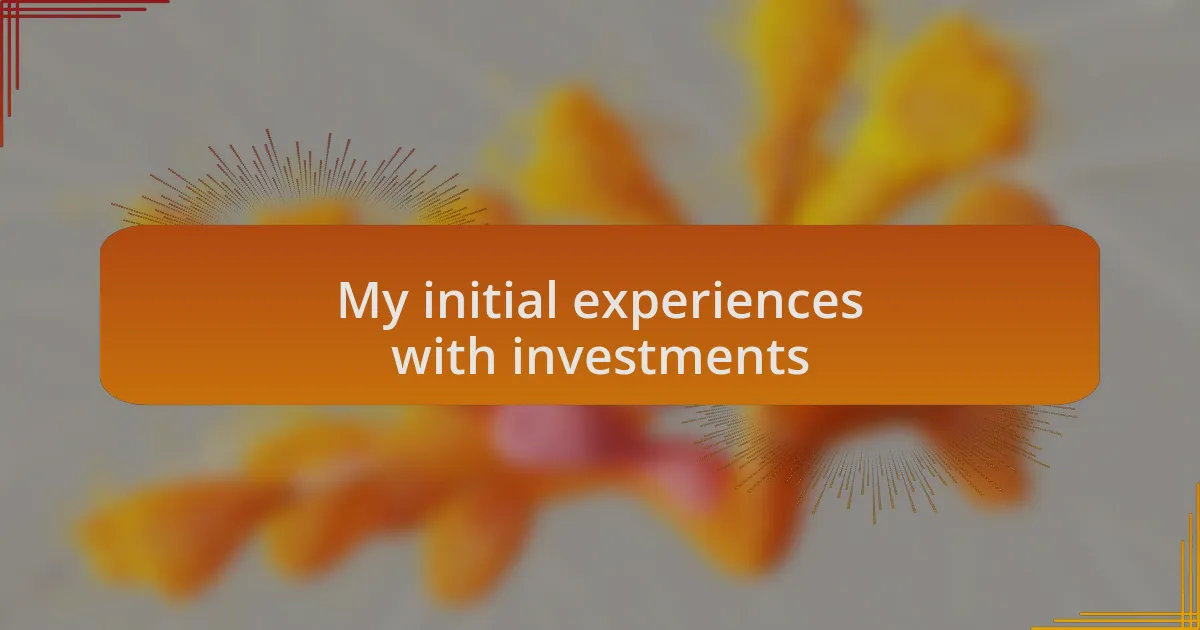
My initial experiences with investments
I remember my very first investment; it felt like stepping onto a tightrope without a safety net. I had invested in a small, community-based initiative aimed at improving access to healthcare. As I dug into the details, I felt a mix of anxiety and excitement. Would my funding really make a difference? This early experience taught me that every dollar can hold significant potential—it just depends on where you place it.
As I navigated through my initial investment journey, I encountered numerous challenges. There was one project focused on sustainable agriculture that struggled to gain traction. I found myself wondering, was I too quick to jump in? Through this, I realized the importance of patience and resilience. Sometimes, the hardest part isn’t just investing money; it’s learning how to support a vision that may take time to mature and flourish.
What truly shaped my perspective was a moment of clarity during a community event connected to one of my investments. I saw firsthand the smiles on people’s faces as they benefited from the initiatives I supported. Wasn’t that the ultimate goal? It reminded me that beyond numbers and spreadsheets, the heart of social impact investing lies in the lives we touch and uplift. Each investment, I learned, is a stepping stone toward a more compassionate society.
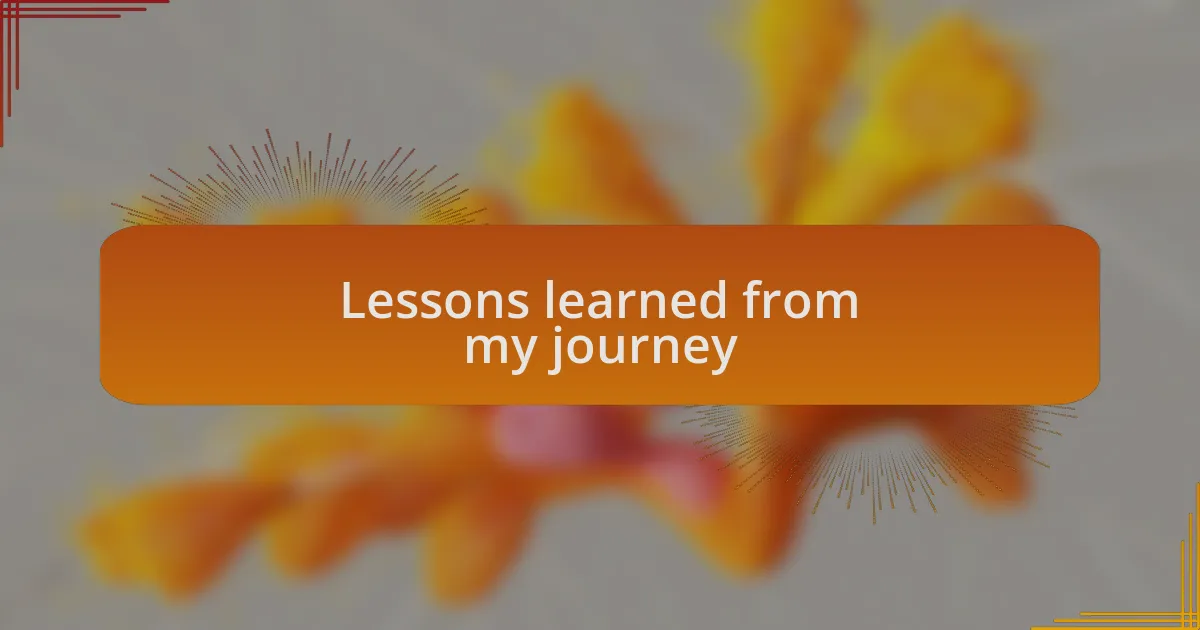
Lessons learned from my journey
Every experience along my journey has held a lesson, but a standout moment was when I faced a project that fell short of its ambitious goals. I remember attending a project meeting where the team was visibly defeated. It was a stark reminder that enthusiasm isn’t enough; effective execution and strong community support are crucial. Reflecting on that, I learned the value of aligning investments not just with great ideas but with capable, passionate leaders.
Another lesson came from the personal relationships I built while investing. One evening, I shared a meal with project founders who had dedicated years to their cause. Their stories were filled with sacrifices and hopes, and I realized that investing goes beyond financial contributions. It’s about building trust and forming connections. Have you ever considered how these relationships can amplify your impact? For me, they’ve transformed my perspective on what it means to be an engaged investor.
Lastly, I discovered that flexibility is key in social impact investments. On one occasion, I had to pivot my support from a struggling initiative to another with more immediate potential. It was a tough decision, but I understood that remaining adaptable allows for more significant impact where it matters most. How willing are you to change course if necessary? In my journey, I found that staying open to new paths often leads to unforeseen opportunities for profound impact.